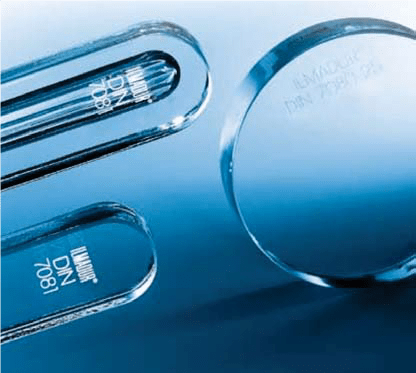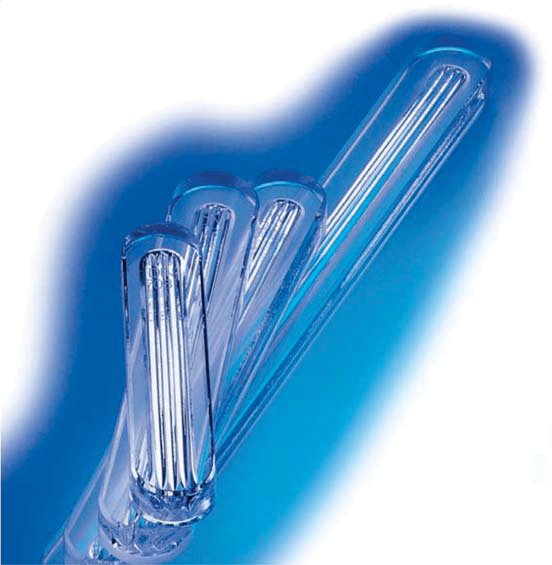Borosilicate Gauge glasses

DESCRIPTION
Gauge glasses have high mechanical strength and are exceptionally resistant to alkalis, acids and boiler water (within the service limitation). Our glass testing laboratory carries out continuously quality control tests: purity of glass, flaws in glass, dimensional accuracy, etc. This ensures the high quality standard of gauge glasses.
TYPE
REFLEX GLASSES
APPLICATIONS
TRANSPARENT GLASSES
Transparent glasses are also manufactured from “extra-hard” borosilicate glass. The surfaces on both sides are finely ground and polished to ensure optimal transparency.
APPLICATIONS
In steam service above 35 bar and with media with a high pHvalue. transparent glasses must be protected by a mica shield on the side facing the medium chamber. Transparent glasses should always be chosen for contaminated, viscous or corrosive media. Within the given service limitations they may be used for all media except steam at pressures up to 340 bar or temperatures up to 400 °C.
TECHNICAL SPECIFICATION
MECHANICAL PROPERTIES
Compressive prestress
Standard:150 N/mm2 High Pressure:180 N/mm2
Standard:80 N/mm2 High Pressure:100 N/mm2
THERMAL PROPERTIES AND SERVICE CONDITIONS
Max. service temperature: 300 °C
Unprotected level gauge glasses: 35 bar at 243 °C
Transparent level gauge glasses protected with mica:103 bar at 320 °C
Transparent level gauge glasses in contact with media without significant
glass corrosion: 180 bar at 400 °C
High Pressure transparent level gauge glasses: 415 bar at 35 °C
Thermal shock resistance: ΔTmin. 265 K
FINISHES
Surfaces: polished
Lateral Surfaces: plain moulded or ground (for manufactoring reasons beveled 1,5°)
Edges: beveled at an angle of 30° or 45°
Width of sealing surface: min. 5 mm for 30 mm wide level gauge glasses, min. 6 mm for 34 mm wide level gauge glasses
TYPE
CIRCULAR SIGHT GLASSES
Circular glasses are also manufactured from “extra-hard” borosilicate glass. Borosilicate glass, thermally pre- stressed, optically tested, properties as laid down in DIN and OeNORM. Extract from the OeNORM: Chemical pre-stressing of glasses is not permissible. For safety reasons soda-lime glasses may not be used.
APPLICATIONS
Transition temperature: TG=550 °C,
Temperature resistance: Suitable for temperatures from – 273 °C To + 300 °C, size 31.75/12.7 up to 356 °C.
TECHNICAL SPECIFICATION
MECHANICAL PROPERTIES
Tensile bending strength: ≥160 N/mm2
Compressive prestress: ≥100N/mm2
THERMAL PROPERTIES AND SER VICE CONDITIONS
Max. service temperature: 300 °C
Thermal shock resistance: Δ T min. 265 K
FINISHES
Surfaces: polished
Lateral Surfaces: plain moulded or ground (for manufactoring reasons beveled 1,5°)
Edges: beveled



